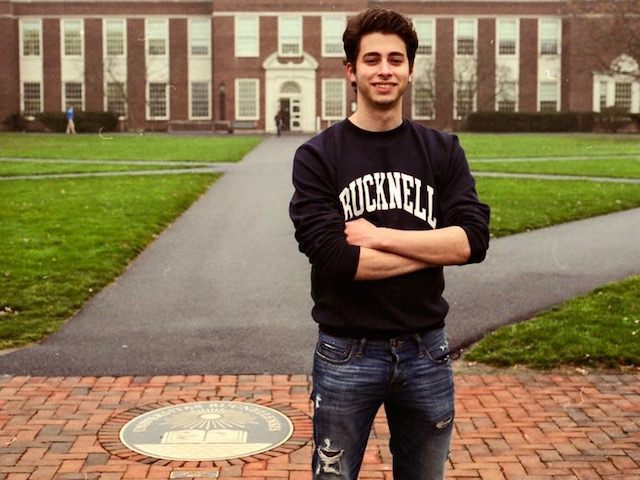Just a few weeks ago, activist Nyle Fort spoke at my school, Bucknell University, during a speaker series for Martin Luther King, Jr. week. In a book he published in 2014, Fort justified the use of violence by saying “that under conditions of white supremacist terror, revolutionary violence can be an expression of Christian love… Presenting nonviolence as the only possible Christian response to racial terror is not only unreasonable, but unrighteous.”
There were no protests at Mr. Fort’s event. No signs were torn down or defaced. So you can imagine that when I invited the provocative but humorous Breitbart editor Milo Yiannopoulos to campus, I did not anticipate any uproar.
I was wrong. There was significant student and faculty opposition to the use of university funds to bring Mr. Yiannopoulos to campus, though there had been none about bringing Mr. Fort and his rhetoric to campus. I don’t know how much Fort was paid; Yiannopoulos asked for no speaking fee.
In the weeks leading up to Yiannopoulos’s visit to Bucknell, event posters were torn down and defaced and petitions and calls were made by students and faculty to the university president to have the event cancelled. I was called a “pathetic excuse for a leader.” Attacks were made on my relationships with my family. Someone accused me of being the kid who only wore Hollister in high school. They may have had me with that last one.
But my decision to bring Milo Yiannopoulos to campus started discussions that never otherwise would have happened. The outrage and buzz surrounding the event filled the auditorium to capacity, which forced the university to turn at least 50 people away at the door, some of whom had travelled for hours to attend.
My threat to donate five dollars to the Donald Trump campaign for every student disruption — and Milo’s offer to match it — kept Bucknellians impeccably behaved throughout the lecture.
The chaos of the week leading up to the event felt so unusual and unnecessary when I watched students laugh hysterically at Milo explaining why he doesn’t find Ben Carson hot (“It’s hard to find someone attractive who is on so much Ambien”) and how he thought that the local high-security federal penitentiary would have been an upgrade over the grim hotel that the university had provided.
However, it was what followed the event that really struck me. Several students reached out and thanked me for planning the event. For the first time, issues that arise with the Left owning and controlling the intellectual means of production were being examined and critiqued.
Academia is obliged to give students the tools to become critical thinkers who come to their own conclusions. Students ought to be taught how to think, not what to think. Students should be able to critically think outside the range of allowable opinion and never have to fear that they aren’t allowed to be wrong. And there isn’t a person on the planet less afraid to be himself than Milo Yiannopoulos.
One student reached out to me about how her experience with Milo completely changed her perspective and bolstered her confidence. She told me that Milo taught her that “it’s okay to be yourself.”
Given the overwhelmingly positive response to this event, the petty restrictions the university subjected us to seem ridiculous in hindsight.
Thanks to the Bucknell administration’s fear of liability — or perhaps bad press — for potential violence or harassment towards Milo, or members of the Bucknell College Republicans, they decided to place an officer outside of the club’s dinner with Milo.
The university did not allow the College Republicans club to film the event, instead choosing to film the event themselves, and then decide after if they would release it to the club. Was the university more fearful of being associated with Milo Yiannopoulos and his message, or with that their students couldn’t behave themselves when faced with his message?
During his lecture, administrators only permitted students to interact with Yiannopoulos by writing their questions for him on index cards, which I then read to him. When he was finished, he was escorted out of the building. (Milo usually spends hours at the end of his talks meeting fans and taking pictures.)
Since the lecture, I have had time to reflect on the nature of the opposition to Milo. The unifying theme in calls to cancel the event throughout the week seemed to be that ideas were dangerous, and that harmful ideas infringed upon student safety.
But ideas and speech are not dangerous: only actions are, unless we’re talking about direct incitements to violence. Obviously, a gay journalist with conservative opinions does not qualify.
The best way to defeat ideas is not to censor them, but to challenge them and defeat them. If you believe someone is wrong, the best way to beat them is to shine a spotlight on their ideas and to challenge them, not try to hide them or prevent them from being heard.
This week Bucknell realized that Milo’s ideas and conservative positions aren’t harmful at all. The “trigger warning” and “safe space” hysterics must be feeling pretty silly.
As Milo reminded Bucknellians: “[Conservatives and liberals] want the same things, we just have different ways of getting there.” I’m not quite sure what to make of it all yet, except for that it was all incredibly worth it; this crazy, terrifying, wonderful week that I brought Milo Yiannopoulos to campus.
Tom Ciccotta is President of the Class of 2017 at Bucknell University, President of Bucknell College Republicans and Station Manager of WVBU 90.5 FM Central Pennsylvania.

COMMENTS
Please let us know if you're having issues with commenting.